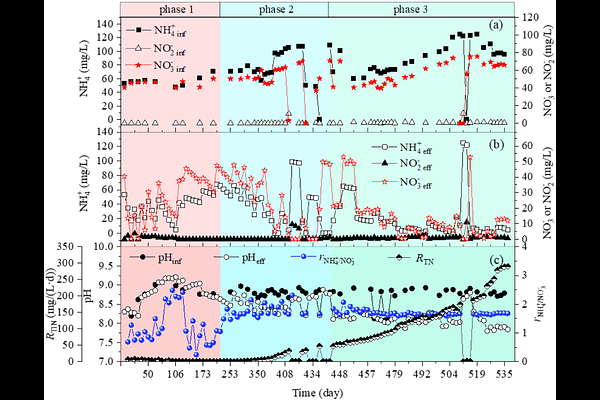A new nitrogen biochemical process: Oxidization of ammonium into nitrogen gas using nitrate

A new nitrogen biochemical process: Oxidization of ammonium into nitrogen gas using nitrate
lv, x.; zhang, s.; gu, p.; han, x.; li, q.; huang, j.; qu, z.; zhao, d.; wang, z.; li, k.; wang, c.
AbstractThe nitrifying bacteria oxidize ammonium into nitrite or nitrate under aerobic conditions, while the anaerobic ammonia-oxidizing bacteria utilize nitrite to oxidize ammonium into nitrogen gas under anaerobic conditions. There is no biochemical process that can directly oxidize ammonium into nitrogen gas using nitrate under anaerobic conditions. In this study, mature anaerobic ammonium oxidation (anammox) granular sludge was inoculated in an anaerobic nitrogen-removal system, while nitrate and ammonium were used as the influent substrates. The experiment was conducted for 537 days at a temperature of 30-32; and a pH of 8.0-9.0. The transformation from nitrite-anammox to nitrate-anammox was stably achieved on the 350th day. The experimental results showed that, nitrate directly oxidized ammonium into nitrogen gas under anaerobic conditions. The produced gas consisted of 96.3% nitrogen and 3.7% carbon dioxide. The removal ratio of ammonium to nitrate was approximately 1.67:1, and the total inorganic nitrogen removal rate reached up to 290.20 mg/(L{middle dot}d). Unlike the nitrite-anammox reaction, this reaction was accompanied by an acid production process, which caused a decrease in pH. When the substrate was changed to nitrite and ammonium, the total nitrogen removal rate of only 1.1-1.3 mg/(L{middle dot}d) was achieved. This new biochemical reaction of nitrogen was defined as nitrate-anammox. The study reveals a new pathway of nitrogen transformation, providing novel insights into the global nitrogen cycle.